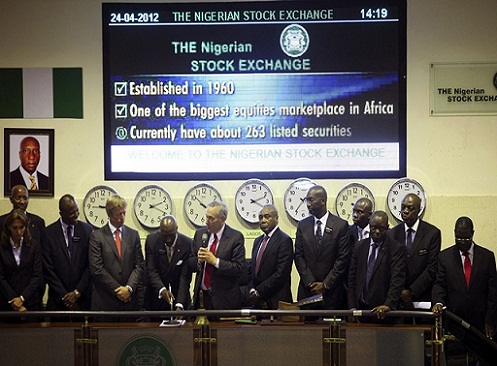
By Goddy Egene
The Nigerian equities market has lost N1.822 trillion in capitalisation in the last 11 months as the market succumbed to forces within local and international financial markets. The market, which opened the year with a capitalisation of N13.226 trillion closed at N11.404 trillion last Friday.
This decline in market value followed recent massive equities sell-offs that was triggered by exit of foreign investors and local investors as a result of falling oil prices and political and economic uncertainties.
Although the Nigerian market put up an impressive performance in the last two years and a moderate growth was expected this year, the huge decline recorded in the last one month was least expected.
Most of the losses recorded in the last 11 months came in November alone. For instance, the market dipped by N1.4 trillion in the first week of the month alone. However, low valuations attracted some investors back to the market, which later moderated the overall loss to be at N1.8 trillion as at the end of November. Contrarily, this time last year, the market was already boasting of a growth of N3.543 trillion in capitalisation or 39 per cent. However, the market is heading for a negative close this year with just one month to end the year.
Though the market witnessed a rebound last week, heavy losses in the previous weeks took a toll on the overall performance, hence the N1.822 trillion negative performance year-to-date (YTD).
Market analysts attributed the bearish trend to exit of foreign and domestic investors, who are said to the raising concerns over the uncertain political environment, falling oil prices and poor results declared by many companies for the third quarter ended September 30, 2014.
According to an operator, preparations for 2015 general elections have shifted government attention aware from the economy. Also, analysts from investment firm, Meristem Securities Limited, said the sustained fall in oil prices in recent times continued to arouse anxiety over Nigeria’s political, financial and economic space, as government and other key stakeholders evaluate the possible impact of low prices on the nation’s economic and financial stability.
Market operators said the exit of foreign investors which triggered the sell-off had brought to the fore the need for regulators to encourage more domestic to patronise the market. Since the downturn of 2008, retail investors who got their fingers burnt are yet to return leaving the market for foreign investors to have a field day.
A financial advisory firm, Afrinvest West Africa Limited, recently said the fixed income market had also been characterised by an increased amount of sell-offs, as yields have generally been on the rise especially on the longer end of the yield curve.
“Given the current economic and political headwinds coupled with the intensified outflow of capital owing to the depreciating naira, we anticipate sustenance of the bearish trend in the capital market,” the report noted.
Analysts attributed the persistent bearish trend at the exchange to a combination of factors, accentuated by the speculative attacks on naira in recent times.
According to Managing Director, Financial Derivatives Company Limited, Mr. Bismarck Rewane, the Nigerian capital market is merely reacting to a chain of economic development including the activities of financial market speculators.
“First and foremost, market capitalisation will shed some more because the market was already slightly overpriced. Again, the international investors do not know when the exchange rate issue will be settled. So, they are just taking their money out because, no matter what gain they make from the market, for instance, if they make a 10 per cent gain, and there is 10 per cent devaluation then, everything will amount to zero,” he said.

FRENCH VERSION
Cette baisse de valeur de marché suivi récentes actions massivescessions qui a été déclenchée par la sortie des investisseursétrangers et des investisseurs locaux en raison de la baisse desprix du pétrole et les incertitudes politiques et économiques.
Bien que le marché a connu un rebond la semaine dernière,lourdes pertes dans les dernières semaines a pris un péage sur laperformance globale, d’où le N1.822 billion performance négativeyear-to-date (CDA).
Selon un opérateur, préparations pour les élections générales de2015 ont changé attention gouvernement au courant del’économie. En outre, selon les analystes du méristème SecuritiesLimited, entreprise d’investissement, tombe le soutenue des prixdu pétrole ces derniers temps a continué de susciter l’inquiétudeau-dessus du Nigéria, politique, financier et espace économique,comme le gouvernement et les autres parties prenantes évaluerl’impact éventuel de bas prix sur la stabilité économique etfinancière de la nation.
« Étant donné les vents actuels économiques et politiquescontraires couplés avec l’intensification sortie de capitaux en raison de la naira qui se déprécient, nous prévoyons lasubsistance de la tendance baissière sur le marché des capitaux, »le rapport a noté.
“Tout d’abord, capitalisation boursière jettera plus encore parce que le marché était déjà un peu trop cher. Encore une fois, lesinvestisseurs internationaux ne sais pas quand la question du tauxde change est évaluée. Alors, ils prennent juste leur argent horsparce que, peu importe quel gain qu’ils font du marché, parexemple, s’ils font un 10 pour cent de gain et il y a 10 pour centdévaluation puis, tout s’élèvera à zéro, “dit-il.


